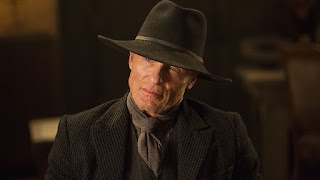True Purpose
"Westworld" began its second season on April 22. The series, created by Jonathan Nolan and Lisa Joy, is based on the film from Michael Crichton, and is poised to be HBO's next big dramatic series. Each week I'll be exploring the episodes through recaps of season two.
"You think death favors you, that it brought you back. But death's decisions are final. It's only the living are inconstant, they waver, don't know who they are or what they want. Death is always true. You haven't known a true thing in all your life. You think you know death, but you don't." - William, "Westworld"
While some of the aims of the characters and goals are more straightforward, the way "Westworld" is told remains similar to season one. There are interesting shifts on the time line, big reveals, and it's all moving, deliberately but not fast, toward a big showdown. And much like with other large ensemble shows, such as "Game of Thrones," the sprawling cast and sprawling goals for the characters make it so you don't see everyone, or pick up pieces of every thread, in every episode.
We've seen a future where most of the hosts are gone and Bernard (Jeffrey Wright) remains. But how did we get there? That's most of what we've been trying to discern as the season has unfolded, moving back and forth across timelines as we see the immediate aftermath of the events Ford (Anthony Hopkins) set in motion, and seeing where things lie a few weeks later. But what happened in between?
We've seen that we're moving toward some kind of showdown between Dolores (Evan Rachel Wood) and William (Ed Harris). They are both heading to the same place, and both seem to be spurred by Ford to do so. For Dolores, it was an awakening. For William, it's a forced invitation to play a game that, even after last night's episode, he doesn't fully understand.
While last week focused a bit on Dolores, this fourth episode, "The Riddle of the Sphinx," gave us a view of William, both in the park and in his life's journey. And it answered, in part, one of the big questions. When we first met William (Jimmi Simpson) he is somewhat of a wide-eyed innocent. He is enamored of the park and its possibility. Earlier this season, we saw him talking to Delores, reflecting on what he'd learned and the tone he'd be taking moving forward. And last night we got another window into that process.
William tried to use the technology to save his father-in-law, James Delos (Peter Mullan), even when medical science couldn't. We see a series of attempts and interactions as they pilot this new technology. None works quite right. And toward the end the older William (Ed Harris) carries a sad weight to him. He tells the reconstructed James Delos the world is likely better off without him. His wife is dead. His daughter, William's wife, killed herself. And his son faded away into a drug-induced oblivion. He isn't missed, and some times death is the right result for some people. He ends that statement concluding that may, well, be true of him, too.
It's a dark chapter that gives some clarity on how William became the Man in Black. But it also tells us about Westworld, and Delos. We knew in Season One it was a place where people could act out their darkest fantasies, which is something worth quite a bit. But the Delos Corporation investment in the park was much more than that. We know they were keeping information on guests, to be used as leverage, but they were also conducting experiments that test the limits of the technology. But to what purpose? We don't know yet, but I'm curious as to how that plays into the quest William and Delores are on.
And now William isn't making the journey alone. It turns out that the introduction of Grace (Katja Herbers) last week wasn't just a fun way to expand the world. We see her again in this episode, captured among the natives and clearly knowing more about the park than a regular guest. After her escape from the Hosts, it would have been reasonable to forget about her and her story.
But there she was at the end, reunited with her father, William. What does it all mean? Where is it all leading? We don't yet know, but I'm intrigued to find out.




Comments
Post a Comment